
Vol. XXII, No. 1, January 2022
The metaverse and its implications for location-based leisure

On October 28th,"metaverse" became a buzzword after Facebook CEO Mark Zuckerberg announced that Facebook was changing its corporate name to Meta, with plans to develop a metaverse where people, as digital avatars, will socialize, work and play in a 3-D virtual environment. His idea is to create an immersive successor to today's internet in which we'll spend our time engaging in virtual spaces and experiences rather than in the physical world. Facebook is hiring over 10,000 people to work on it and backing the initiative with tens of billions of dollars.
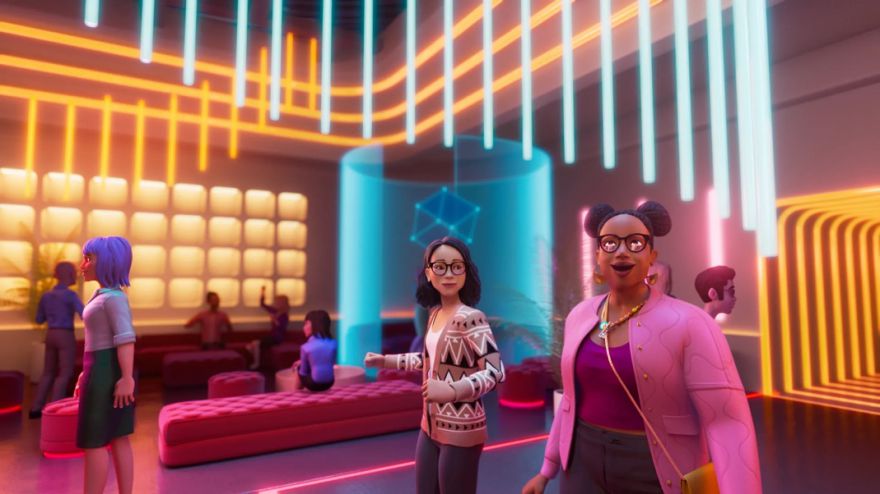
Meta (Facebook) isn't the only company developing the metaverse. FOMO is also sucking companies such as Microsoft, Unity Software, andNvidia Corp. and Chinese companies like Alibaba, Baidu, ByteDance, andTencent into an arms race of pouring hundreds of millions of investment dollars into their versions of it.
The idea of the metaverse is not new. It's been nearly 30 years since the term "metaverse" was initially coined in Neal Stephenson's 1992 science-fiction novel, Snow Crash. In the book, the metaverse is a shared imaginary place that's available over the worldwide fiber-optics network and projected onto virtual reality googles where people use digital avatars of themselves in an imaginary online world to interact with other users, can be who they want to be, and do whatever they want to do, often as a way of escaping a dystopian reality.
Could the metaverse change our lives by shifting much of our existence from being rooted in the physical world to one in which our digital presence increasingly supplements our real one? Zuckerberg's version of the metaverse may be years away, but not as many as you might think. In a sense, we have already started our transition to experiencing many activities in the digital world. The metaverse is the next iteration of the digital existence we're already living.
The pandemic accelerated many digital trends already in motion forward by five to seven years. It forced people in a matter of just months to entirely swap the physical for the digital world, creating a mass migration of socialization and entertainment from the real to the digital world. Rapid digital technology options facilitated the shift. This included increased digital engagement by digital natives and increased use by digital immigrants, who had previously not been digitally engaged or were only minimally so.
The pandemic led to extraordinarily more time spent in virtual worlds and the de-stigmatization of spending time in those virtual worlds. Over the past almost two years, much of human life moved digitally online in unprecedented ways. We went to birthday parties on Zoom, attended company meetings over Microsoft Teams, spent billions of collective hours and hundreds of millions of real dollars in games like Fortnite, Roblox, and Animal Crossing. We attended virtual concerts. So, in a lesser sense, the metaverse is already here - in bits and pieces. Immersive videogames, virtual concerts, and virtual watch parties have already given us a taste of what the metaverse might offer. So, a further transition to a more immersive online presence seems inevitable.
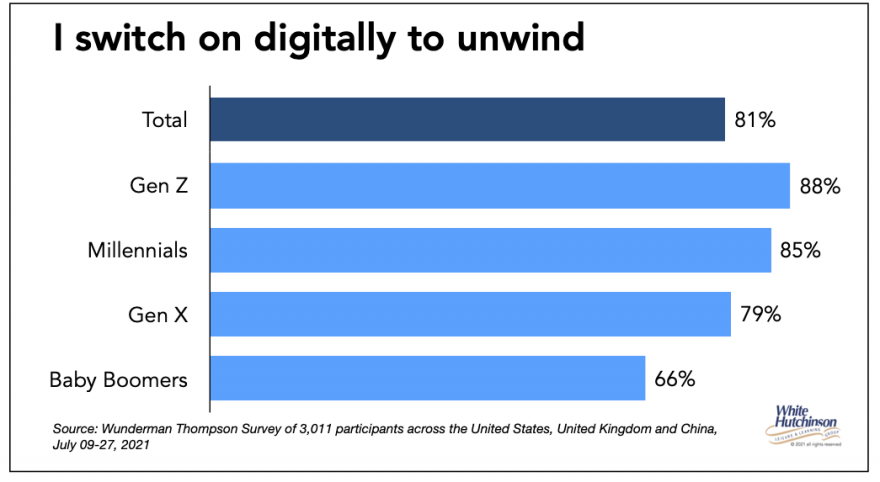
Right now, the metaverse Zuckerberg describes is still the stuff of science fiction. If you've seen Ready Player One, the Matrix,or played video games like Robloxor Fortnitewith their thriving virtual worlds, then you're already seeing glimpses of it, as well as what it can potentially offer. As technology continues to evolve, we're getting closer to seeing and experiencing a more fleshed-out version of the expansive and immersive virtual world of the metaverse..
Meta announced that it was working on a new virtual reality device meant to introduce people to metaverse-like experiences. The codename for that device is Project Cambria. New sensors and improved optics in the device will make avatar-you more like real-you. You smile; your avatar smiles! It's possible that Meta will introduce the Project Cambria device in 2022. Meanwhile, there are reports of a late 2022 release of an Apple mixed-reality headset with both VR and AR features.
We will need more advanced and comfortable headsets with higher resolution and better battery life to get to the metaverse. We will also need great haptic gear. These will require higher computing power, so everything, including our avatars, will be lifelike.
The time when technology advances to offer those improvements may not be that far off. In his book The Exponential Age: How Accelerating Technology is Transforming Business, Politics and Society , Azeem Azhar explains that we live in an age of exponential advancement and adoption of digital technologies. He discusses how digital technologies and their hardware are undergoing constant acceleration due to increases in computing power, 50% or more every year, and continual decreases in price. He goes on to explain, "If a task is too expensive today [for computing power], it probably won't be too expensive in a couple of years." That means the computing power and hardware Meta and other companies will need to create the metaverse could be just around the corner. He also points out that humans, with a history of only undergoing gradual linear change, consistently underestimate the speed and power of exponential change and its social transformation.
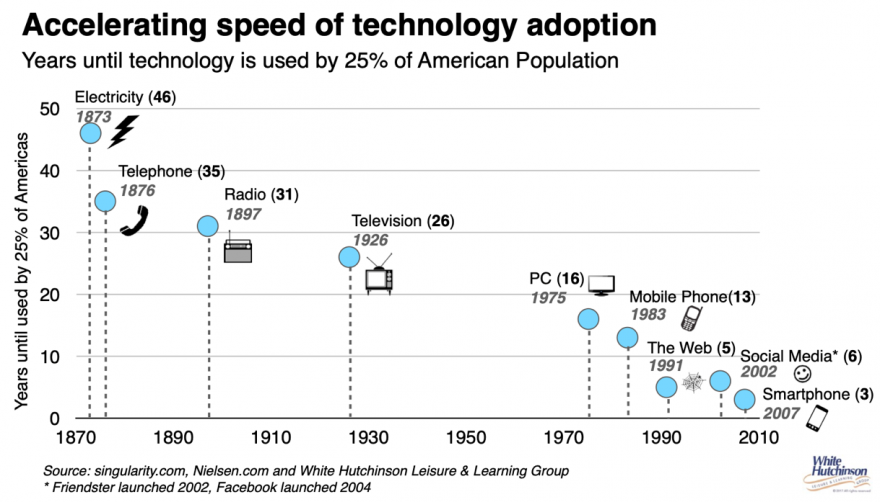
The metaverse is sure to have a significant impact on our social lives. Before the growth of the internet, there were only three different places where people spent their time - 1stPlace home, 2ndPlace work, and 3rdPlaces. 3rd Places are the informal out-of-home places between home and work people have sought out and gathered in to socialize in the pleasure of good company and lively conversation. They include bars, cafes, coffee shops, hair salons, community centers, clubs, and recently even social-eatertainment venues.
3rdPlaces are in the real world. We were stuck in one place - home - without access to 3rdPlaces during most of the pandemic. Social media prepared us for meeting friends through technology. So, we've tried to recreate many of those activities and their social experiences with online digital technology. This included tours of museums, virtual concert attendance, Zoom wine tastings, dinners online, book clubs, games nights out, virtual watch parties of movies and video content, playing video games with friends, etc. All these digital activities that attempt to recreate 3rd Place social leisure activities while stuck at home are an entirely new category of occasion and experience that Trajectory in the U.K. has labeled as the 4thPlace - a digital space that attempts to recreate real-world leisure and socialization. The pandemic has driven the adoption of the 4thPlace.
4thPlaces are not the same as 3rdPlaces. They change it. Socializing in 4thPlaces is very different than socializing in the real world. Trajectory identified five basic characteristics of 4thPlaces.
- They are digital, not physical places. They are not dependent on proximity in a geographic community to exist.
- Often they are private and closed rather than open and accessible by anyone.
- Common interests or existing connections sustain them.
- They are about leisure, interaction, and socialization.
- They provide a sense of co-presence and company, even when physically alone.
One of the most significant differences and attributes of 4thPlaces is they eliminate the need for a common physical locality. There is no difference if you socialize with someone across the street or on the other side of the world. They allow you to create new communities and significantly expand the group of people you can have simultaneous social and entertainment experiences with. Whereas at 3rd Places anyone can come in, 4thPlaces can be closed to only a curated group of people. Another big difference is you can be anonymous in a 4thPlace, pretending some identity, so no one knows who you are.
Many people will continue their pandemic-acquired 4th Place routines in the post-pandemic world because not only have they become habits, but they allow them to build community and meet new people. Many 4th Places have already established communities and a sense of belonging.
The big difference between our current virtual world 4thPlaces where you are represented by a username, a 2D video image of yourself, or a 2D picture of your avatar is that in the metaverse you are represented by a lifelike avatar in a 3D world where you have presence of being in it with face-to-face interactions. This is sure to heighten the social appeal of the metaverse and its appeal as a digital replacement for IRL 3 rdPlaces and other IRL experiences.
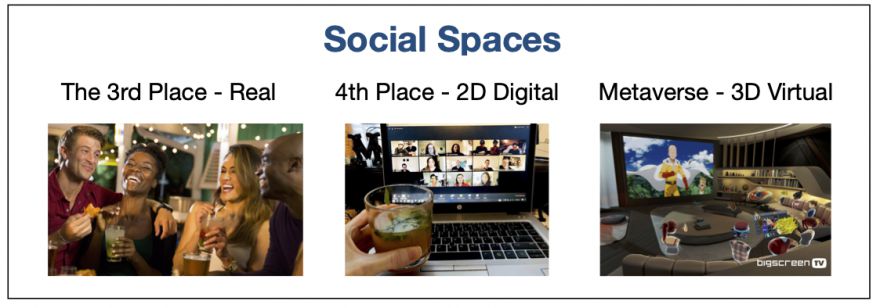
Based on the exponential speed with which technology advances, Zuckerberg's vision of the metaverse could well be right around the corner. And in the meanwhile, we will see technological advances to digital 4thPlaces. This poses a real threat to the future of many out-of-home leisure venues.
We've already seen a continuing decline in the time people spend away from home, primarily due to all the at-home digital options they have to do things they used to do away-from-home. This includes a decline in IRL socializing and leisure. In 2019, before the pandemic hit, people age 15+ spent 20 minutes more each day in digital leisure at home than they did in 2005. This wasn't just attributable to older teenagers and young adults. Adults age 25+ spent 23 minutes more on digital at-home leisure in 2019 than in 2005.
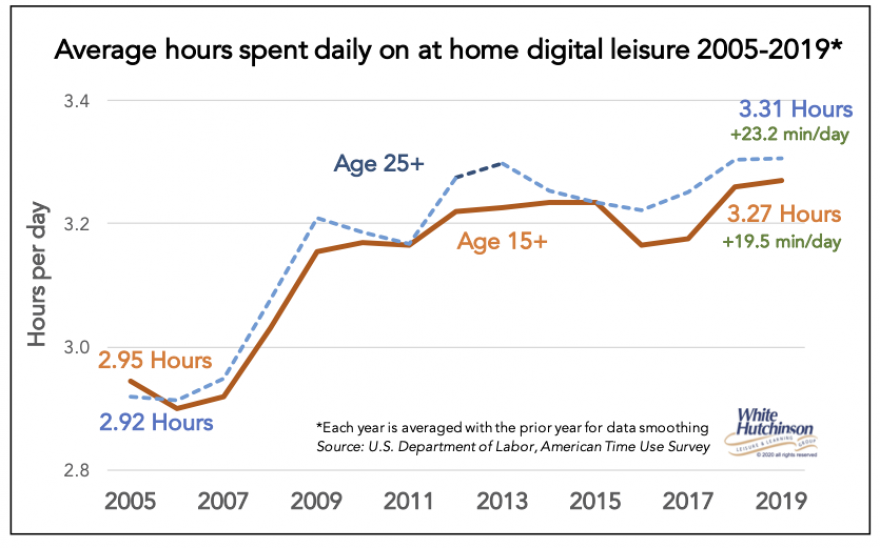
As a result of more digital time and other factors, age 15+ spent one-half hour less time away from home in 2019 than in 2005. Measured in awake days (hours awake each day), that's 12 fewer full days away from home.
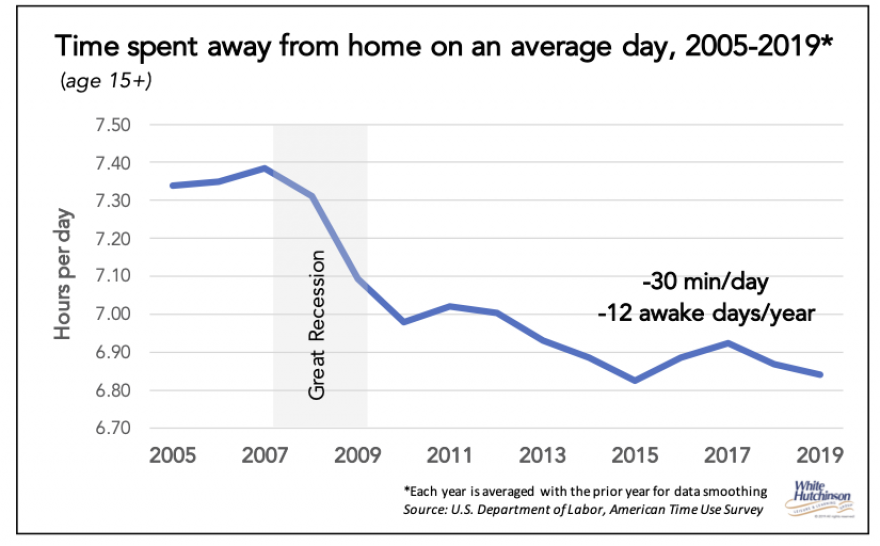
The continuation of this trend into the post-pandemic era is confirmed by a recent October 2021 survey by YPulse. They found that over six in ten Gen Z and millennials (61%) say that going out is more effort than it's worth and are instead staying in, even on weekends. And two-thirds say they are going out less than a year ago (68%). Many say they are not interested in going to a nightclub, bar, brewery, or pub ever again.
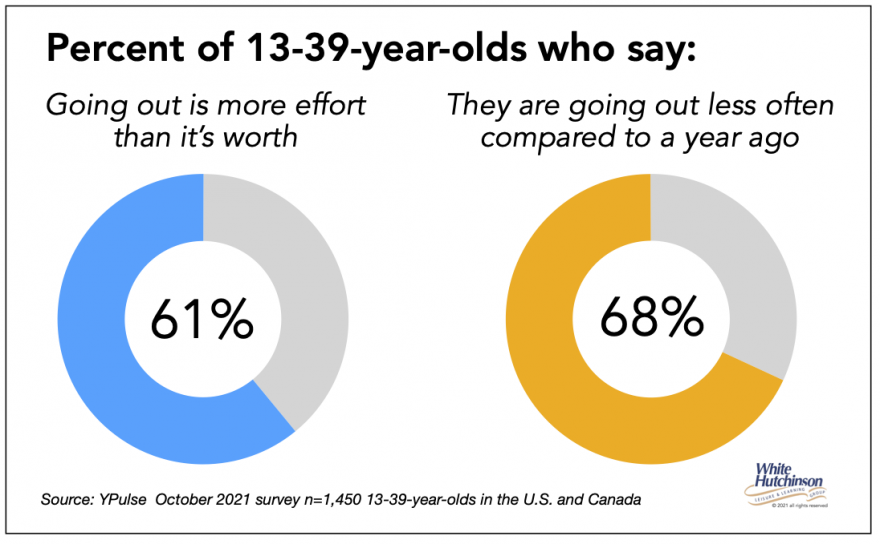
Many other names for time at home has being on a gradual increase for decades include home-basing, hometainment, cocooning, bunkering, hygge, and digital-hiving. And Covid has accelerated the trend, with 4thPlaces becoming the new normal for many people, resulting in a future where less time will be spent away from home participating in many out-of-home leisure, social, and entertainment experiences. The metaverse is sure to exacerbate this trend with its presence, making it closer to real-world 3rdPlace experiences.
A survey back in June shows how significant the digital world has become to the younger generations. The survey found that six in ten Gen Zs and millennials believe how they present themselves online is more important than how they present themselves in person. In other words, their digital presence is now more important than their real life one.
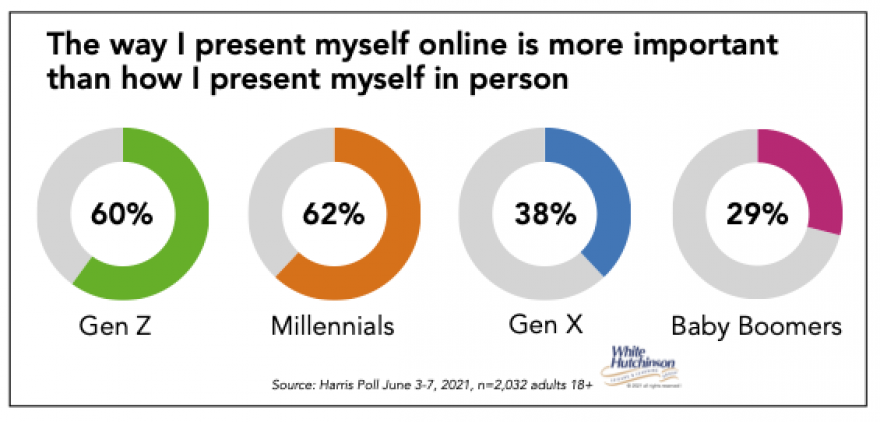
One of the primary reasons people visit IRL 3rdPlaces is to socialize. This is even true of going out with family or friends at a sit-down restaurant or different leisure venues. The primary appeal of role-play 4thPlace video game platforms is to meet and socialize. Video games have evolved from just games into 4thPlace social platforms for a newfound way to stay in touch with people, make new friends, and socialize. There are now many social simulation games. In many respects, the gaming aspect became secondary to a digital place where people could connect and spend time together in a 4 thPlace. Digital 4thPlaces are becoming the new hangouts, the new social.
Many people will be continuing their pandemic-acquired 4thPlace virtual routines because not only have they have become habits, but they allow them to build community and meet new people. According to the most recent data, 86% of Gen Z and 73% of millennials engage in 4th Place activities.
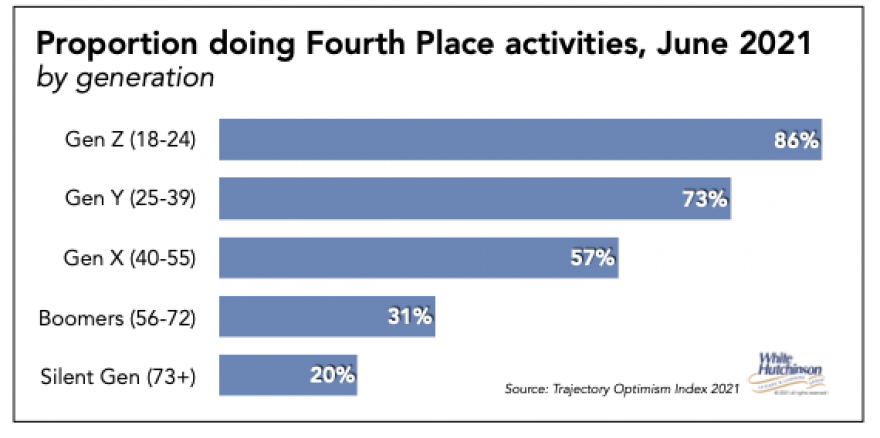
One of the best predictors of forming a permanent habit is the frequency of engaging in the activity. Many of the 4thPlace activities are done almost daily. Other criteria for developing the habit of making 4thPlace participation permanent are:
- The length of time you do it - research shows that doing an activity becomes a habit at a maximum of 254 days. We're now almost two years into the pandemic, with many people continuing to avoid public venues.
- The activity has to bring some benefits.
- The constraints on continuing it need to be low.
- Pleasure-based habits are tough to stop.
Another possible factor is that virtually-mediated socialization is safer and less stressful than in-person conversation. We've gotten comfortable being alone together.
We're already seeing glimpses of what the metaverse might offer. Game companies with role-play immersive games like Roblox, Epic Games' Fortnite, and Grand Theft Auto already have metaverse-like platforms. Immersive gaming platforms are transforming into a space rather than a specific game experience. They are merging social media, gameplay, and entertainment, offering a glimpse of what the metaverse might become. BigScreenVR and Meta's own Horizon Worlds are examples of crude early-stage metaverse type experiences. They replicate our offline behaviors with VR-enabled trips to the cinema, rocket launches, sporting events, and other activities where you and your family or friends attend as avatars.
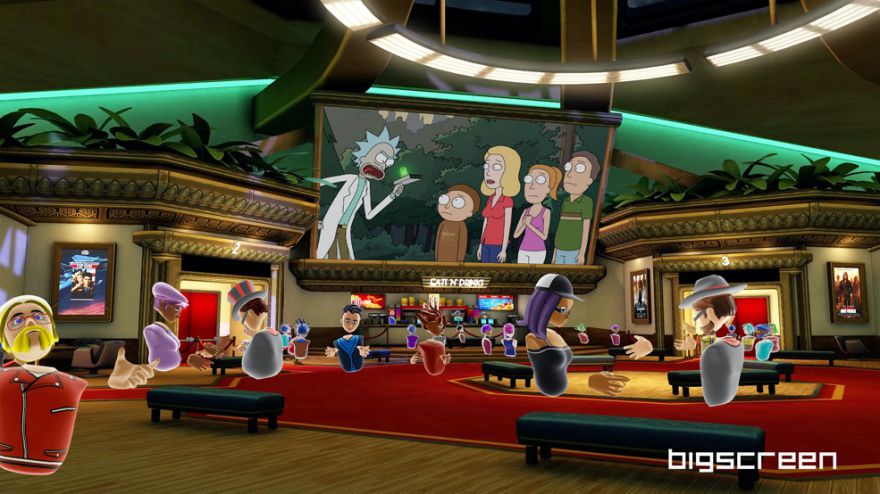
Although developed for the enterprise market, Microsoft Mesh is showing where the metaverse might be headed.
Meta and others see the future metaverse as so compelling that it will largely or entirely replace today's "flat" internet, and it will be used for everything from corporate meetings to shopping to social gatherings and entertainment. Rachel Kowert, an Ontario, Canada-based psychologist who has studied the mental health of games, says, "There's the possibility to preferring it [the metaverse] to traditional life."
Attending digital events is very appealing to people who have heard about the metaverse.
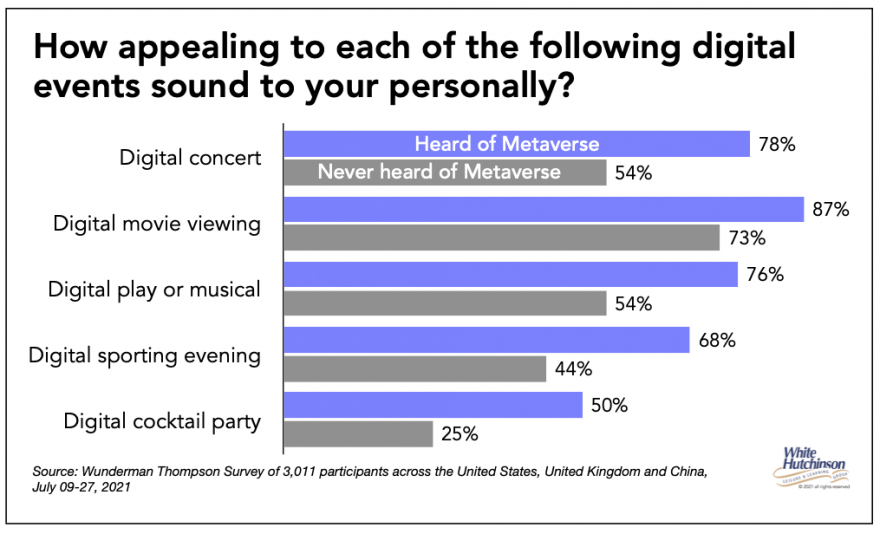
Implications
The rapid advancement and appeal of meta-like 4thPlaces and the metaverse itself could be coming faster than most people anticipate. This is a real threat to traditional location-based leisure venues (LBLs) of all types.
The Covid pandemic has irreversibly altered our habits and our lifestyles. We rebuilt our entire lifestyles around our homes and digital 4th Places during the pandemic. Now, with the option of spending time at home socializing in the 4th Place, the appeal of staying at home has grown. The arrival of more advanced 4th Place options and the more immersive metaverse will only make digital time in our homes even more appealing. Now, instead of asking, "Is there a reason to do this online?" people will be asking, "Is there a good reason to leave home and do this in person?" Even if just some of our increased constant connectivity and digital engagement sticks and continues after the pandemic is long gone, it will considerably impact reduced participation in out-of-home socialization and leisure/entertainment activities. Location-based leisure venues will be less relevant for leisure, entertainment, and maintaining social connection.
The traditional approach of LBLs has been to reply on models that succeeded yesterday, based on the strategy that tomorrow might be a little different, but not markedly so. This kind of linear thinking based on the assumption that real change takes over decades rather than years may have worked in the past, but not anymore with the accelerated exponential pace of technological change today. LBLs that can only adapt at an incremental pace will get left behind fast.
To survive in a smaller and continuing to decline out-of-home leisure market size, LBLs need to evolve to stay competitive not only with other LBLs, but to overcome the growing appeal of evolving 4th Places as well as the emerging metaverse. This evolution needs to take place at an accelerating rate.
One answer is to offer social and leisure experiences that are impossible in 4th Places or the metaverse, or at least offer them an elevated level of experience that the digital world can't provide. Food and beverage definitely meet this criterion. Although you can have a virtual cocktail party or dinner with other people, it will never offer the level of sensory experience that watching the cocktails or food being prepared at a bar or exhibition kitchen in a restaurant and then consuming them while socializing with family or friends offers. That is why LBLs that are primarily entertainment-oriented need to evolve to be also known as great food and drink destinations.
During the pandemic, we saw one type of LBL prove to be highly competitive with all the at-home digital options - agritourism - fun on the farm with u-pick and different kinds of festivals, especially ones with seasonal and unique food and drink. Attendance at agritourism farms has been up dramatically since the beginning of the pandemic. This is probably due to at least two factors. Many people have become wary of time spent in-person at indoor public venues due to fear of infection. This fear is likely to stay ingrained with many people way into the future. Expansive outdoor venues are perceived as safe. Secondly, being in real nature with all its sensory experiences will never be replicated, even in the metaverse.
The continued evolution of 4th Places and the coming metaverse will significantly transform our social and leisure lives. Many LBLs can still have a future if they too evolve to be competitive with the increasing at-home digital competition.
To see where futurist Faith Popcorn's BrainReserve believes the metaverse will take us, watch this video, 2035: Welcome To Your Metalife.


